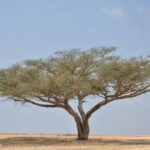Thank you for visiting. We trust that you have enjoyed reading our articles.
Grapes, Giants, and God

“They gave Moses this account: ‘We went into the land to which you sent us, and it does flow with milk and honey! Here is its fruit. But the people who live there are powerful, and the cities are fortified and very large. We even saw descendants of Anak there. The Amalekites live in the Negev; the Hittites, Jebusites and Amorites live in the hill country; and the Canaanites live near the sea and along the Jordan.’ Then Caleb silenced the people before Moses and said, ‘We should go up and take possession of the land, for we can certainly do it’” (Numbers 13:27-30 NIV).
I recently heard a story on the radio in which a study had shown that individuals that were optimistic before they began a large task were more likely to finish the task than those that had a negative attitude. We all know that the optimist sees the glass half full, and the pessimist sees the glass half empty. Yes, …. and the engineer says the glass has been incorrectly manufactured for this application.
Sometimes in life the task before us seems impossible. Some people will focus on all the obstacles to success and then not ever get started. There are usually two different ways to approach an obstacle in life. The story of Israel’s twelve spies always helps me when I am facing an impossibility.
In Numbers 13 Moses sends twelve spies into Canaan to explore the land. They came back and gave a glowing report of the land of “milk and honey” but were but scared to take it because it was heavily fortified, and the people were “giants.” Caleb was among the twelve species and saw the same things as the others, but when he gave his report, he was focused on the positive attributes of the land, “the grapes,” and made no mention of any obstacles.
God called this kind of faith a “different spirit.” “But my servant Caleb, because he has had a different spirit and has followed me fully, I will bring into the land he entered, and his descendants will take possession of it” (Numbers 14: 24, emphasis added). Caleb knew that God wanted the Israelites to have this land (the Promised Land from Exodus 5) and any real or perceived obstacle in the way would be removed because he knew the battle belongs to the Lord.
I think we all have been in situations in which we can see and feel “the giants” around us. It can be paralyzing, and alone we simply cannot proceed. However, if we claim the victory of Philippians 4:13, then we can do it but only through Him.
Peace requires action. After the others gave their pessimistic account of the situation and stirred up the crowd, Caleb “quieted the people” (Numbers 13:30). He chose confidence over fear. He used his words to bring peace to a chaotic situation. You may recall Jesus using His words to rebuke a storm and saying, “Peace, be still (Mark 4:39).” He was calm while the situation around Him was anything but calm.
Jesus told us in this life we will have trouble. Amen? We can either view the trouble as an obstacle or an opportunity. Successful people chose the latter. Caleb saw the opportunity of an “exceeding good land.”
Caleb also knew “If the Lord is pleased with us, then He will bring us in….” (Numbers 14: 8, emphasis added). He searched his own life by prayer to be sure there was nothing within him that was “out of alignment” with the perfect will of God. We cannot face the giants if God is not with us. Sin separates us from God. John 15 is a familiar Scripture of the Vine and the branches. God will be pleased with us, “If you remain in me and my words remain in you, ask whatever you wish, and it will be given you” (John 15:7).” The key to “remaining in Him” is to “confess your sins to each other and pray for each other so that you may be healed. The prayer of a righteous person is powerful and effective” (James 5:16).
The prophetic perfect tense is a literary technique used in the Bible that describes future events that are so certain to happen that they are referred to in the past tense as if they had already happened. Caleb supernaturally saw into the future and envisioned his enemy defeated before the battle began. Numbers 14:9 reads, “Their protection has been removed from them, and the Lord is with us…” This is important because the battle had not even started but yet “their protection had been removed.”
This prophetic perfect tense is perhaps best summed up in Mark 11:24. “Therefore I tell you, whatever you ask for in prayer, believe that you have received it, and it will be yours.” David believed in advance of the battle that God would help him defeat the giant Goliath. Jesus has conquered death, and He can certainly conquer walls, armor, and any real or perceived “giant.”
I think a big part of prayer is to pray to God with gratitude for the victory before the battle. God may not always give us what we want, but He certainly will give us what we need as promised in Philippians 4:19. “But my God shall supply all your need according to His riches in glory by Christ Jesus.” If we are seeking the same things for our life as God is seeking for us, then we know that we are seeking the things that we need. This is the message of Psalm 37:4. “Delight yourself in the Lord, and He will give you the desires of your heart.”
God wants us to see the grapes each day. If giants are present and they are trying to interfere with God’s plans, then they will surely be defeated before the first stone is cast.
Prayer: Thank you for the encouragement from Holy Scripture. Help us to step out in faith and show our appreciation for whatever outcome will occur to our problem. We know that whatever happens, You will walk with us, and somehow good will come I am from it. Help our hearts and minds to truly understand that if You are with us, then who can stand against us? Amen.
Meet the Author
Todd Shupe is a Men’s Ministry Specialist through the General Commission of United Methodist Men and is in training to be a Certified Lay Minister through the Louisiana Conference of the United Methodist Church. He currently serves as the President of the Baton Rouge District of United Methodist Men and is a Board Member for Gulf South Men and serves on the Action Team for The Kingdom Group. He is a volunteer for the Walk to Emmaus, Grace Camp, and Iron Sharpens Iron. Todd resides in Baton Rouge, Louisiana.
We welcome your comments below.
Liked this post?
Read more below or search for more topics...
-
We All Are A Child Of Peter AND Judas
We All Are A Child Of Peter AND Judas “Jesus answered, ‘I tell you, Peter, before the rooster crows today, you will deny three times that you know me’” (Luke 22:34 NIV). “Then one of the Twelve—the one called Judas Iscariot—went to the chief priests and asked, ‘What are you willing to give me if I deliver him over to you?’ So they counted out for him thirty pieces of silver. From then on Judas watched for an opportunity to hand him over (Matthew 26:14-16 NIV). Judas and Peter are two of the most well-known disciples of Jesus. They were both called and blessed to have... -
Thanksgiving Is Not Just For November
Thanksgiving Is Not Just For November "Whatever happens, give thanks, because it is God’s will in Christ Jesus that you do this” (1 Thessalonians 5:18 GW). I love Thanksgiving! It is a fun time of year to get together with family, eat some great home cooked meals, and watch football. Thanksgiving is a time for us to reflect on the past year and identify things which we are thankful. In some families, they go around the table and each person states one or two things for which they are thankful. God has blessed us with many emotions with which we can express ourselves. ... -
Lessons Learned Under A Broom Tree
Lessons Learned Under A Broom Tree “A voice said to him, Why are you here, Elijah? He replied, “I have been most zealous for the Lord, the God of hosts, but the Israelites have forsaken your covenant. They have destroyed your altars and murdered your prophets by the sword. I alone remain, and they seek to take my life.” (1 Kings 19:13-14 NIV). The broom tree is a desert shrub that grows across Arabia and throughout the Judean wilderness. Its deep roots draw in the moisture of land that is otherwise barren. In the Bible, desert shrubs such as the broom tree...



